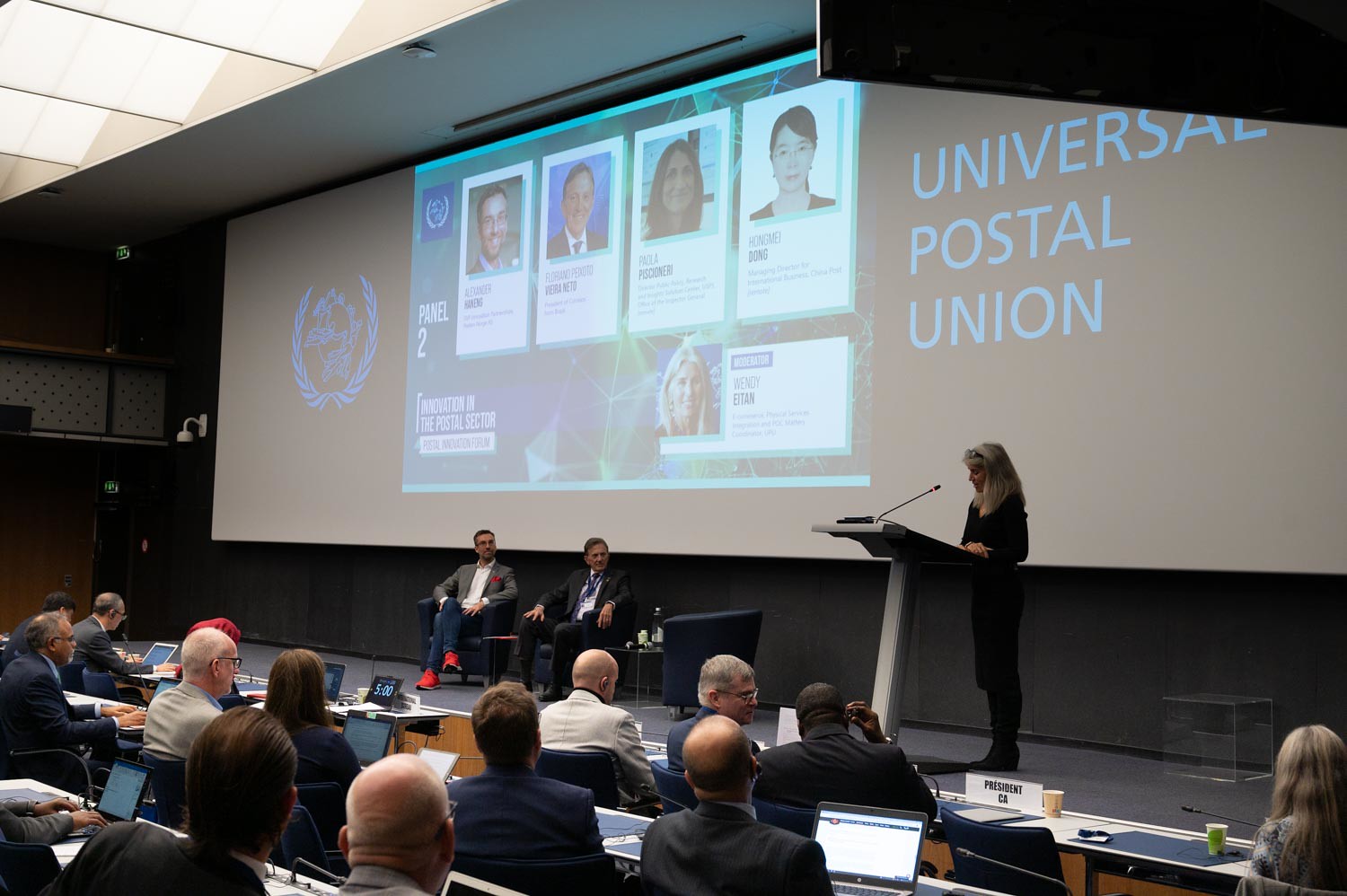
The first Postal Innovation Forum was held during the UPU’s Postal Operations Council sessions, bringing representatives from the postal industry together to talk about innovation as a cross-cutting issue that is driving the growth of the sector.
Dr Robert Giezendanner-Thoben, Director of Industry Affairs,
Vice Presidency for Innovation, at École Polytechnique Fédérale de Lausanne
(EPFL) opened the Forum with a keynote address describing the success factors
of innovation based on his experience at the school’s Innovation Park.
“The only way to move forward in innovation is with collaboration,” said
Giezendanner-Thoben, who noted that the Innovation Park brought together a
diverse group including academics, start-ups, NGOs and policy-makers. “At the
interface of different domains, new ideas appear,” he added.
For Giezendanner-Thoben, another key condition of innovation was a willingness
to fail and try again.
A fireside chat on managing innovation in the UPU with Council of
Administration Chair Isaac Gnamba-Yao (Côte d’Ivoire) and Postal Operations
Council Chair Jean-Paul Forceville (France), which was facilitated by UPU
Deputy Director General Marjan Osvald, reinforced the importance of culture
change in the postal sector to enhance the relevance and impact of postal
services in meeting development goals.
“I think we ourselves should change our ‘software’,” said Gnamba-Yao, adding,
“We need to change the way we work with governments to show them we can be that
development pillar that reaches the heart of their mission.”
Responsive regulation needed
The Forum’s first panel explored regulatory conditions necessary for
encouraging innovation, underlining the importance of agile and collaborative
approaches to develop regulatory frameworks that would be flexible enough to
meet fast-changing user needs.
Cullen International Principal Analyst Cathrine Grimseid provided a global
overview of the state of postal regulation, noting that relationships between
postal operators and regulators were not uniform in every country.
Ezan Azira Mohd Jaafar, Head of Courier Department for the Malaysian
Communications and Multimedia Commission Postal Courier and e-Commerce
Division, shared the country’s regulation lab concept, which brings together
government agencies in co-regulatory approach with all operators to share
data, nurture technological capabilities of the sector and ensure postal
services are developed in line with customers’ needs.
Jairo Luis Marulanda Lazcarro, Deputy Director of Postal Affairs for the
Colombian Ministry of Information Technology and Communications, echoed the
importance of exchanging information between all players and to enable agile
and modern regulation that meets rapidly evolving market needs.
“Regulators should be the link between the operator and the customer. We are in
touch with users to know what the expectations are and ensure those can be
met,” he said.
Brian K. Mwansa, Head of Postal for the Communications Regulators’ Association
of Southern Africa, added that “informed guidelines are more effective
guidelines,” noting that regulators should review their frameworks frequently
and in conjunction with current sector data.
Customerization is key
Turning back to innovation within postal operators, the Forum’s second panel
carried the focus on customer needs, narrowing in on the importance of
customerization as part of the innovation process.
Paola Piscioneri, Director of Public Policy for the USPS Office of the
Inspector General’s Research and Insights Solution Center, emphasized the need
for non-technological innovations to precede and set the conditions for the use
of new digital solutions. She highlighted how the pandemic proved that rapid
changes to postal business models were possible and successful within USPS.
“COVID has been an accelerator in innovation. Technologies that would take
years to employ have been implemented in record time,” she said.
Correios President Floriano Peixoto Vieira Neto supported the need for agile
business models to keep up with the market.
“In the past we used to tell customers what their needs and expectations should
be, now they tell us exactly how, when and where those needs need to be
answered,” he said. He added that the post had implemented a mobile platform,
24/7 parcel lockers, late delivery, delivery next store, and last-mile delivery
algorithms to meet these fast-changing needs.
Innovation requires partnerships
Alexander Haneng, Senior Vice-President of Innovation Partnerships for Posten
Norge, pointed out that customization extended past quality of services to
sustainability of services as well. The circular economy also relied on
logistical support, he said, noting that this was an untapped opportunity for
the Postal sector. Driven by partnerships the postal sector can bring a
strong impact on sustainable development and the circular economy, with
reusable packaging, delivery efficiency, and returns and recycling of goods.
Hongmei Dong, Managing Director for International Business, China Post,
mentioned that COVID had driven innovation.
“With people and businesses being locked down, logistics fulfillment solutions
have been developed with the customers to ensure end-to-end solutions are
available,” she said. “We have provided not only postal Customs clearance but
also cross-border e-commerce clearance. We are very happy to develop these
services together with our postal partners.”
New innovation dialogue
The forum concluded that the UPU and its stakeholders have a great opportunity
to encourage a new dialogue between policymakers, regulators, Posts and the
market to enhance innovation possibilities sustainability, and customer
satisfaction. Data driven innovation will prepare well informed decisions.
The UPU Deputy Director General closed the Forum with a message to member
countries: “We have heard that the management should support innovation and you
have our promise that we will support innovation within the Union.”
The next edition of the UPU Innovation Forum will be held in 2023.
Watch the full UPU Postal Innovation Forum recording here.


